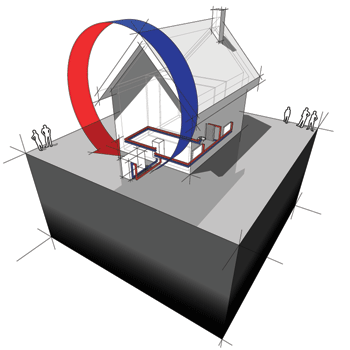While many of the federal tax incentives for energy-efficient residential HVAC systems expired a couple of years ago, the tax credit for geothermal heat pumps (and home solar systems) remains in effect through 2016. This means homeowners still have a year to write off a big part of their investment for this super-efficient technology, the geothermal heat pump.
How Does a Geothermal System Work?
Geothermal systems start with a network of pipes buried on your property, or submerged in a body of water. The ground system can either be a shallow horizontal loop field or a very deep vertical loop field, depending on what sort of lot your house is built on, among other factors. A liquid solution — usually a mixture of antifreeze and water — serves as the medium of heat exchange.For heating, the solution circulates in the pipes, extracting heat from the ground, which is a moderate 50-60 degrees. The heat energy is transferred from the water solution to a heat pump unit inside the house, and then transferred into indoor air, which is distributed via a blower fan and ducts, just as with any heat pump system. Cooling with a geothermal heat pump works the same way, except that heat energy extracted from the house is transferred to the water-antifreeze solution, and then "rejected" into the ground.
Why is this So Efficient?
The energy used in a standard air-source heat pump is mainly used to extract heat energy from cold air for heating, or to release heat energy into very warm air for cooling. When the heat is being released from, or deposited into, ground or water that's neither hot nor cold, much less energy is required. This is what happens with a geothermal heat pump.
How Do the Tax Credits Work?
The energy-efficiency federal tax credit equals 30 percent of the cost of purchasing and installing an Energy Star-qualified geothermal heat pump in your home or second residence (not rentals).
For more information on installing an energy-saving geothermal heating and cooling system in your Broken Arrow area home, please contact us at Air Assurance.
Our goal is to help educate our customers in the Tulsa and Broken Arrow, Oklahoma area about energy and home comfort issues (specific to HVAC systems). Credit/Copyright Attribution: “karen roach/Shutterstock”








